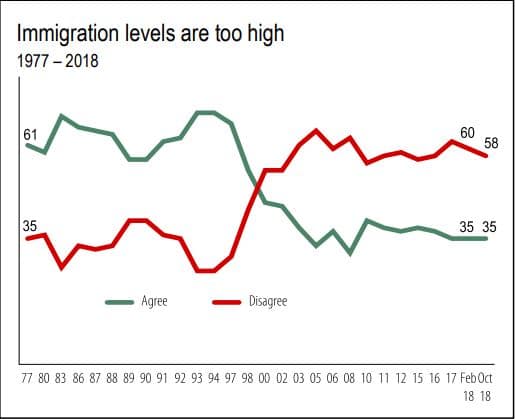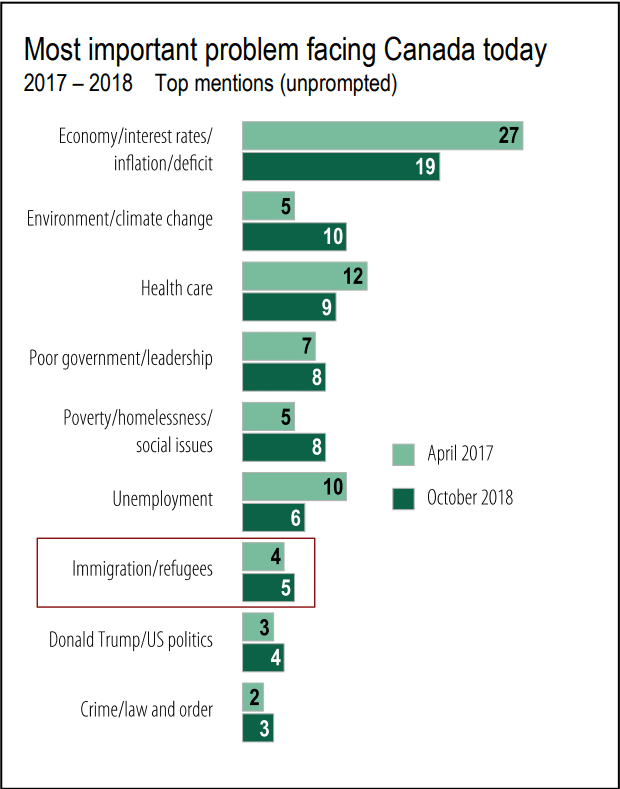Majority of Canadians continue to see immigration in a positive light, new survey shows
A majority of Canadians continue to hold a positive attitude toward immigration despite the increasing politicization of the issue, a new opinion survey shows.
Conducted by the Environics Institute in October, the survey of 2,000 Canadians found only minor movement in opinions on these issues since the institute last surveyed Canadian views on immigration in February 2018.
To the statement “Overall, there is too much immigration in Canada,” 58 per cent of those interviewed disagreed, down slightly from 60 per cent in February. The number of Canadians who agreed with this view remained constant at 35 per cent, while the number with no clear opinion grew by two points, to seven per cent.

This chart shows responses in favour or against the statement 'Overall, there is too much immigration to Canada.' Source: Environics Institute
More than three-quarters of Canadians – 76 per cent – continue to believe that immigration has a positive impact on Canada's economy, the Environics Institute found. This was down slightly from the 80 per cent who held this view in February. The number of Canadians who disagreed with this view rose slightly, from 16 to 18 per cent.
In terms of views on the overall impact of immigrants on Canada, the survey found Canadians say immigration is making Canada a better place by an almost three-to-one margin over those who say it isn't (45 per cent versus 17 per cent).
"There is no public consensus on the overall impact that immigration has on the country, but the balance of opinion is clearly in a positive direction, and has held steady over the past seven years," the study concluded.
To find out if your eligible for any Canadian immigration programs, fill out a free assessment.
Immigration a national problem? Most Canadians say no
The Environics Institute found that a slim majority of Canadians, 52 per cent, believe too many immigrants aren't adopting Canadian values. Those who held this point of view outnumbered the 41 per cent of Canadians who disagreed with it.
The survey noted, however, that concerns about the integration of immigrants “remain lower than for most of the last 25 years.”
In terms of the Canadian values immigrants should be learning and adopting, both Canadian-born and foreign-born participants held similar views. Both groups put "respect for Canada's history and culture" first, followed by fluency in English or French, tolerance for each other and respect for the law.
Overall, the survey found immigration well down the list of priority concerns for most Canadians compared to other issues like the economy, the environment and health care.
“The salience of immigration and refugee issues as a national problem is low across regions and demographic groups, edging only as high as seven per cent among Quebecers and Canadians with no more than a high school diploma,” the institute found.

Demographic breakdown
British Columbia led Canada's provinces in its positive attitude toward immigration, with 63 per cent of respondents there rejecting the idea that Canada welcomes too many immigrants.
More than 60 per cent of Canadians under the age of 45 and 70 per cent of those with a university degree also rejected this idea.
Canadians under the age of 45 were also more likely to believe that immigration is good for Canada's economy, as were those with higher levels of education and income.
The Environics Institute said a negative perspective on immigration was "most evident" in Alberta, where 42 per cent of those interviewed agreed with the statement that Canada is welcoming too many immigrants and 64 per cent disagreed that immigration has a positive impact on Canada's economy.
Canadians with no more than a high school education were also more likely to express negative views of immigration.
At the federal political level, the survey found supporters of Prime Minister Justin Trudeau's Liberal Party of Canada were the most favourably inclined toward immigration while supporters of the Conservative Party of Canada and the new right-wing Peoples Party of Canada were the most likely to hold negative views of immigration.
To find out if you are eligible for any Canadian immigration programs, fill out a free assessment.
© 2018 CICNews All Rights Reserved
- Do you need Canadian immigration assistance? Contact the Contact Cohen Immigration Law firm by completing our form
- Send us your feedback or your non-legal assistance questions by emailing us at media@canadavisa.com







